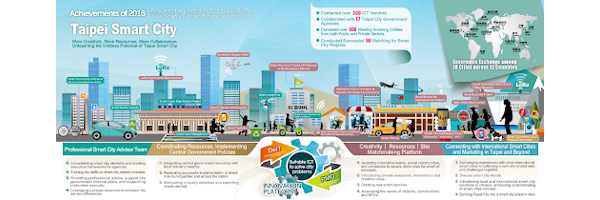Taipei Smart City Living Lab
Jump to navigation
Jump to search
| Taipei Smart City Living Lab | |
|---|---|

| |
 Taipei Smart City Living Lab | |
| Team Organizations | Department of Information Technology Taipei City Taiwan |
| Team Leaders | Wei Bin Lee |
| Participating Municipalities | Taipei Taiwan |
| Status | Launched |
| Document | None |
Description
- Taipei has been transformed into a living lab through the efforts of public-private partnership. The matchmaking mechanism efficiently solves city problems and citizen demands, as well as instantly promoting government plans and integrating private resources. It is a much more positive and comprehensive approach, compared to the methods adopted by other cities, promoting their projects either in a top-down or bottom-up fashion.
- Once this matching mechanism matures, Taiwan’s smart city industry will be in full motion and many solutions will be quickly copied by other international cities. At that point, Taipei will become a focal point for the smart city brand and best practice model.
Challenges
- In Taiwan, the collaboration between the public sector and partners in the industry and academia is often limited by regulations placing strict rules upon the role played by the former.
Solutions
- Taipei City Government Department of Information Technology (DOIT) established the Taipei Smart City Project Management Office (PMO) in 2016. Through the public-private Partnership scheme, DOIT and PMO worked together to collect and determine the needs of the government and its citizens.
- They also worked on introducing innovative and creative resources from the private sector, strengthening the capabilities of city agencies to meet citizens’ expectations, and making the city government more open to innovation and changes.
- In addition to supporting numerous internal projects, DOIT and PMO came up with appropriate scenarios and devised workable resolutions tailor-made for Taipei based on brainstorming exercises and meetings among city agencies, industries, and academia partners.
- One year since its establishment, the platform has successfully conducted more than 60 cases of matchmaking, introduced industry resources in support of central government’s policies, and provided better smart services for citizens. Taipei has been transformed into a living lab through the efforts of public-private partnership.
Major Requirements
- DOIT primarily manages the strategy and design for the long-term visions, while PMO worked on implementation and practical blueprint. PMO conducts the first screening of the proposal, and after combining with needs of the citizens, the proposal is integrated into a scenario. Then PMO discusses the possibility and outcome of the scenario with Taipei City Government agencies to devise a suitable solution which could be piloted and eventually, implemented in Taipei.
- The main mission of the PMO is to raise public participation and public-private partnership to introduce new technologies, innovative applications, and information to solve citizens’ problems. Taipei City government hopes to create an eco-system so that the government, the industry, and citizens can share the prosperity from its development.
- Since March, 2016, DOIT worked with PMO to interview about 200 companies, hosted nearly 600 public-private matching meetings, and continued to cooperate with 17 agencies in the city government.
- Various successful smart service matchmakings have been accomplished; for example, a collaboration with Taipei City Fire Department on UAV disaster relief communication program. It involves using UAV as communication transmission station when a disaster happens and establishing a transmission platform to deliver messages to optimize rescue efforts. Another project involves the Department of Economic Development in building the Taipei IoT Innovation Lab to accelerate the development of innovative services.
- The aforementioned smart service applications were all jointly initiated and executed by the partnership of DOIT and PMO over the public-private matching platform.
Performance Targets
| Key Performance Indicators (KPIs) | Measurement Methods |
|---|---|
|
|
Standards, Replicability, Scalability, and Sustainability
- Establishes standardized procedures for introducing and matching all the new practices and solutions into the government (no matter for the top-down or bottom-up modes)
- Organizes committees of IOT standards for being implemented in the given project fields.
- The long-term goal is to spin off the PMO as a financial-independent company, only partly subsidizing from the government.
- The same mode could be operated in other local governments. So far, many governments have shown their curiosity in this project.
Cybersecurity and Privacy
TBD
Impacts
- DOIT and PMO constantly communicate with other agencies and companies by sharing domestic and international successful cases. They overcame the difficulties and successfully conducted matchmaking for over 60 cases within a year.
- The new model of DOIT and PMO’s public-private partnership is the only such project model in Taiwan. This matchmaking mechanism efficiently solves city problems and citizen demands, as well as instantly promoting government plans and integrating private resources.
Demonstration/Deployment
- Shows the posters of diagrams and procedures to explain the whole system
- Demonstrate 1-2 successful cases / stories from the system